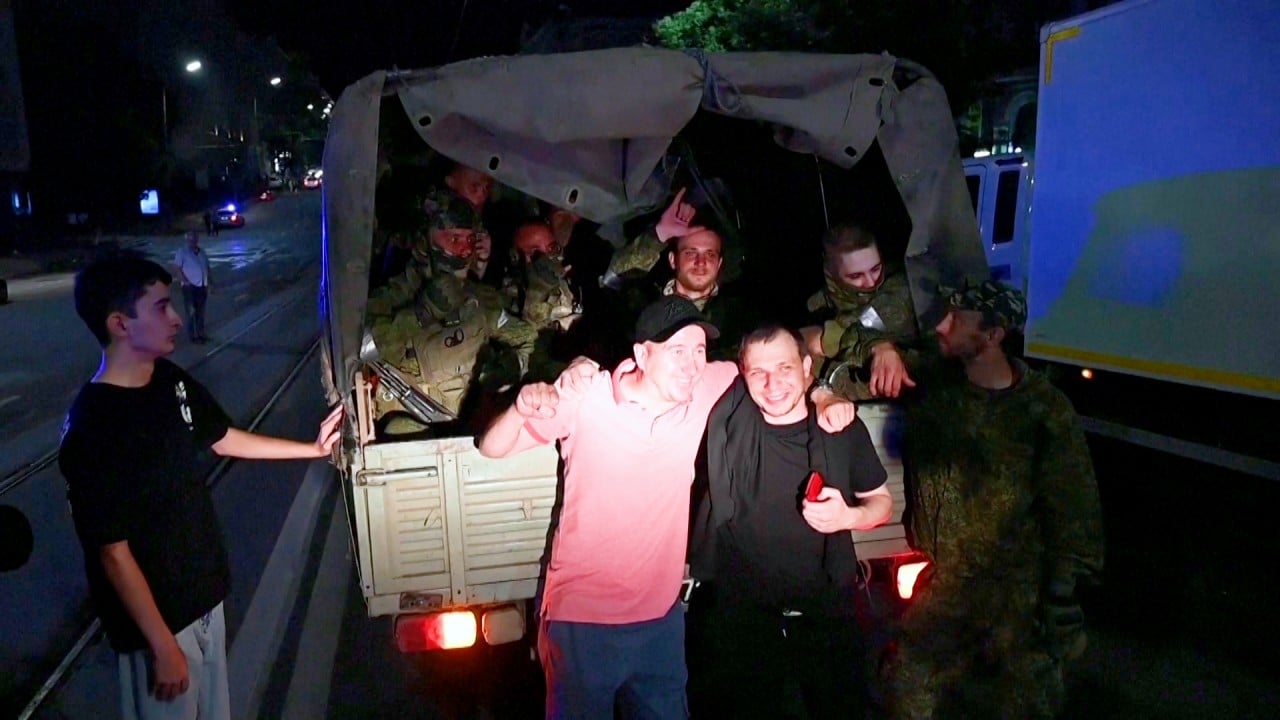
Russian defence minister Sergei Shoigu appears in video for first time since Wagner mutiny
- Defence Minister Sergei Shoigu shown on Russian TV after failed mutiny by Wagner forces this weekend
- Shoigu was one of the main targets of Wagner mercenary boss Yevgeny Prigozhin, who led the brief rebellion
Russian Defence Minister Sergei Shoigu was shown speaking to troops in a video released by his ministry on Monday, his first known appearance in public since a mutiny by the Wagner mercenary group.
There was no sound on the video and it was not immediately clear where or when the visit had taken place.
Shoigu was shown flying in an aircraft with a colleague and hearing reports at a command post run by Russia’s Zapad (West) military grouping.
The Defence Ministry TV channel, Zvezda, said Shoigu, who looked physically unharmed and calm, had listened to a report by Colonel General Yevgeny Nikiforov, the group’s commander, about the current situation on the front lines in Ukraine.

In his mutiny during which he seized control of Russia’s military headquarters in southern Russia, renegade Wagner mercenary boss Yevgeny Prigozhin had demanded that Shoigu and Valery Gerasimov, the Chief of the General Staff, be handed over to him so that he could “restore justice”.
Prigozhin accused both men of gross incompetence and corruption and had long been agitating for their removal.
6 Hongkongers in Russia seek immigration help after aborted mutiny by mercenaries
Gerasimov has not been seen since in public, and there was no word from the Kremlin about any new personnel changes when it described the deal that had ended the mutiny.
The Kremlin said the question of personnel changes was the sole prerogative of President Vladimir Putin and could hardly have been part of any deal.
Zvezda said Shoigu on his visit had heard about the formation of new reserve forces for the “Zapad” military grouping and had noted what it called the Russian army’s “high efficiency” at “detecting and destroying enemy military equipment and accumulations of personnel in tactical areas”.
He had tasked them with continuing active reconnaissance in order to reveal the enemy’s plans to thwart Ukrainian forces’ movements far behind the front lines, it said.
Zvezda said Shoigu had also paid particular attention to what it called “the organisation of all-round support for the troops involved in the Special Military Operation and the creation of conditions for the safe housing of personnel”.
Mutineers led by Prigozhin on Saturday advanced towards Moscow to remove what they called Russia’s corrupt and incompetent military leadership, before suddenly heading back to a Russia-held area of eastern Ukraine after a deal with the Kremlin brokered by Belarusian leader Alexander Lukashenko.
The deal, as publicly described by the Kremlin, saw criminal charges against the mutineers dropped in exchange for their return to camps, with Prigozhin said to be moving to Belarus.
Prigozhin was last seen late Saturday in an SUV leaving Rostov-on-Don, where his fighters had seized a military headquarters, to the cheers of some local people.
The brief armed rebellion was timely morale booster for Ukrainian troops, and was greeted “with applause” by commanders of Ukraine’s Eastern Group of Forces, said its spokesperson, Serhii Cherevatiy.
Timeline of how Russia’s mercenary revolt unfolded
“Soldiers at the front lines are positive about it,” he said. “Any chaos and disorder on the enemy’s side benefits us.”
The short-lived rebellion did not noticeably affect Russian army posture along the 1,000km (600-mile) front line in eastern Ukraine, but it could give Ukraine the impetus it needs to intensify its counteroffensive, which military leaders have admitted is going slower than expected.
“In the short term, it distracted attention from the war and diverted some resources from the front,” said Nigel Gould-Davies, a senior fellow for Russia and Eurasia at the International Institute for Strategic Affairs. But in the longer term, he said, it shows lack of unity among Russia’s fighting forces. “It’s terrible for Russia’s morale. The officers and soldiers alike. It’s very good for Ukraine’s morale.”

On Russian Telegram channels, milbloggers urged Russian soldiers to stay focused on the war. “Brothers! Everyone who holds a weapon at the line of contact, remember, your enemy is across from you,” read one message.
As Wagner troops marched toward Moscow, Hanna Malyar, Ukraine’s deputy defence minister, announced progress in several directions along the front line where fighting has been raging for weeks, and that Russian advances further north were thwarted.
“The enemy’s weakness is always a window of opportunity, it allows us to take the advantage,” she said, adding that it was too early to assess how the political game playing out in Russia might give Ukraine the military upper hand.
Ukraine stepped up attacks in several directions in the southeast earlier this month, a move that signalled its much anticipated counteroffensive had begun. But progress has been “slower than desired,” Ukrainian President Volodymyr Zelensky has acknowledged.
Reuters, Agence France-Presse and Associated Press

